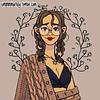Take a photo of a barcode or cover
dark
emotional
mysterious
reflective
tense
fast-paced
Desire and its dangers. Manipulation or lust? Love or hunger? The yearning desire to love and to be loved. To speak whatever words and perform whatever actions to make that a reality. Or simply to coerce your victim to give in. It is a duality, the vampire.
So interesting to read this having experienced the vast majority of vampire art, specifically Dracula related art. It’s all entirely familiar, but is still no less impactful or emotional. So much of the prose could be *felt* on such a deep level. It is exceedingly relatable. That overwhelming sense of connection and love. So much so the story is still being told centuries later. A truly wonderful story.
So interesting to read this having experienced the vast majority of vampire art, specifically Dracula related art. It’s all entirely familiar, but is still no less impactful or emotional. So much of the prose could be *felt* on such a deep level. It is exceedingly relatable. That overwhelming sense of connection and love. So much so the story is still being told centuries later. A truly wonderful story.
slow-paced
Plot or Character Driven:
Plot
Strong character development:
No
Loveable characters:
Complicated
Diverse cast of characters:
No
Flaws of characters a main focus:
No
dark
emotional
mysterious
reflective
tense
fast-paced
Plot or Character Driven:
Plot
Strong character development:
No
Loveable characters:
Yes
Diverse cast of characters:
Complicated
Flaws of characters a main focus:
No
dark
mysterious
slow-paced
Plot or Character Driven:
Character
Strong character development:
Complicated
Loveable characters:
Complicated
Diverse cast of characters:
No
Flaws of characters a main focus:
No
fast-paced
adventurous
mysterious
tense
medium-paced
In a modern sense it doesn't stand very well on its own, but it did help spearhead a subgenre, and paved the way for better stories.
I do find it really interesting in contrast with Dracula. Carmilla predates Drac, though the former is largely forgotten (except by horror lesbians, from what I can tell), while the latter became something of a standard synonym for vampire novels.
And ultimately I think the reason for that boils down to theme. Carmilla does have something of a theme, if a weak and probably overly moralizing one. It's short, it's dull, and it ends with the general feeling of "that was a fun enough way to spend an hour, anyway." But Dracula sticks in the ribs, you feel the struggle of good and evil and the importance of faith and light in the world.
Faith is the key and the turning point of Dracula, while it's nothing but a footnote in Carmilla. And because there is Truth in Dracula, there is also deep evil that is ultimately defeated. In Carmilla, there is no Truth, and no real evil either. Carmilla kills some people, creeps out the narrator/MC, and then dies pretty easily. Which leaves the story thematically dull and empty.
So I like Carmilla for what it ushered in. I've heard that without Carmilla there wouldn't be Dracula, and whether or not I believe that, I do think it made it easier for Dracula to get and remain popular. And the contrast between the two kind of sums up my feelings on middling to bad books in the world. For all the Carmillas, I'm glad they help make space for the Draculas of the world.
I do find it really interesting in contrast with Dracula. Carmilla predates Drac, though the former is largely forgotten (except by horror lesbians, from what I can tell), while the latter became something of a standard synonym for vampire novels.
And ultimately I think the reason for that boils down to theme. Carmilla does have something of a theme, if a weak and probably overly moralizing one. It's short, it's dull, and it ends with the general feeling of "that was a fun enough way to spend an hour, anyway." But Dracula sticks in the ribs, you feel the struggle of good and evil and the importance of faith and light in the world.
Faith is the key and the turning point of Dracula, while it's nothing but a footnote in Carmilla. And because there is Truth in Dracula, there is also deep evil that is ultimately defeated. In Carmilla, there is no Truth, and no real evil either. Carmilla kills some people, creeps out the narrator/MC, and then dies pretty easily. Which leaves the story thematically dull and empty.
So I like Carmilla for what it ushered in. I've heard that without Carmilla there wouldn't be Dracula, and whether or not I believe that, I do think it made it easier for Dracula to get and remain popular. And the contrast between the two kind of sums up my feelings on middling to bad books in the world. For all the Carmillas, I'm glad they help make space for the Draculas of the world.
dark
mysterious
fast-paced
Plot or Character Driven:
Plot
Strong character development:
Complicated
Loveable characters:
Complicated
Diverse cast of characters:
Yes
Flaws of characters a main focus:
No
mysterious
medium-paced
Plot or Character Driven:
Plot
Strong character development:
No
Loveable characters:
Complicated
Diverse cast of characters:
No
Flaws of characters a main focus:
No
mysterious
slow-paced
Plot or Character Driven:
A mix
Strong character development:
No
Loveable characters:
Complicated
Flaws of characters a main focus:
No
This is written in the classic Gothic horror style. There is a mix of character and plot-driven narrative, but there is more telling than showing. The framing is a story being told by Laura to the listener, so there is a mix of first and second person. I like this characteristic of novels! The characterization of the cast was a bit shallow. It felt like all characters represented only four archetypes: brooding man, aristocratic woman, young woman, and maid.
If you like classics, read this! If you like vampires, read this!
If you like classics, read this! If you like vampires, read this!





